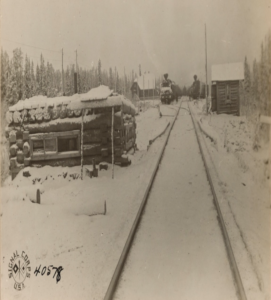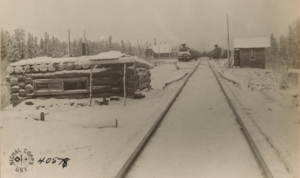17th November 1918 Sunday
Frustration and Conflict
All material produced or reproduced here and throughout this work is the sole copyright of the author and the family of Doctor D.C.M. Page MC.
“On Sunday, the 17th, Capt. Jones, the new M.O. Ambulance Train, and I went up the line on a tour of inspection. We did not go on an engine, but by special train. We went right forward to Verst 455, and found everything very quiet there. A company of the King’s Liverpool Regiment was holding the front position, which consisted of one or two Russian houses and three British-built blockhouses situated in a clearing in the dense forest. The railway ran through the clearing, and on through No Man’s Land towards Petrograd. One could see nothing of the Bolo. positions, as the railway took a bend just beyond our front post. I found no Medical Officer at Verst 455, but there were three – 2 Americans and 1 French – back at Verst 466, who all complained of having nothing to do. When I suggested to the Americans that one of them should be forward at Verst 455, they objected strongly, stating that the firing line was no place for a doctor, and that when British troops were forward a British doctor should be forward too.
I immediately reported the matter to the A.D.M.S., and at the same time sent in my resignation – or rather applied to be relieved of my present post (see Appendix D*).
I also interviewed Col. Lucas when I got back to Obozerskaya, who immediately sent orders up to Verst 466, for one of the American doctors to go forward to Verst 455 for duty.”
*(Appendix D will be published later in the diary)
The arrangements for chain of command with the North Russian Expeditionary Force were that the British would control the whole operation, so all other countries’ contributing armies would take orders from the British high command under General Ironside.
A common complaint from American personnel was that they objected to taking orders from the British officers whom they regarded as treating them badly and with disrespect, something that we will encounter later in the diary as the resentment turned to crime. The misunderstandings were probably as much due to the differences in culture as to any bad treatment although the problem was ingrained from the start under General Poole. Poole had an authoritarian style and ruled more like a colonial governor with a certain lack of sensitivity than might have been needed in such a situation. He had been recalled and replaced by Ironside with the intent of improving that situation.
Douglas had found it increasingly frustrating that the Americans were so reluctant to obey orders from him as although he was the Senior Medical Officer there wasn’t much he could do if a foreign military man refused orders. His frustration boiled over into a request to be relieved.

This picture taken on 15thNovember 1918 is of verst 455. The only name for this clearing in the forest complete with passing loops denoting that the position is 455 versts (a verst = appx 0.66 mile or 1.1 kms) from the original measuring point in the south. On the left is one of the 3 British built blockhouses. They were built from massive logs with walls about a metre thick to withstand enemy fire.

This is the original view which gives the impression of a broad gauge track. There is no evidence that the railway was built with anything other than the normal 5 ft “Russian Gauge” The Railway was begun in 1893 and completed by 1897 by which time gauging agreements would adhere to the 5ft track gauge.
Find out about our connection with Dr Page and an introduction to his diary here